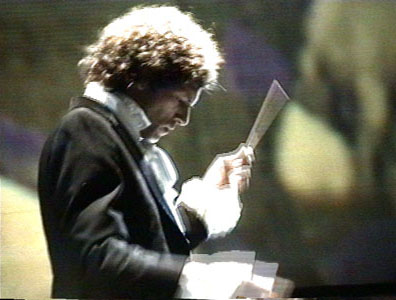
video: Solomon Rivera
JOHN PAYNE

video: Solomon Rivera
John Payne was born not far from the Pacific Ocean in Long Beach, California, at the end of a long line of wanderers -- a French horse thief who fled to England, a Bavarian farmer who died insane on the Ohio River, a Danish Royal Navy deserter, a personal pilot to Howard Hughes, and a lot of Vikings.
Mother played orchestral pieces of Grieg and Tchaikovsky on the family hi-fi. This helped John identify his career goal at age 5: a conductor. His ambition in classical music was soon to receive a tug from the other side. When he was 8, he saved his milk money to buy his first 45 record: Dick Dale's "Miserlou." It was that mysterious, greasy theme that played the piper, though John did not -- and still does not -- consider his love of surf music a directional conflict. He soon grew to be more than 6 feet tall.
When he was 14 (and still a little under his current height of 6'-2 1/2") John began recording his own compositions using experimental engineering techniques. He would assemble a number of mono cassette recorders and overdub by placing an instrument and the speaker of one machine next to the second machine's mic and so on. Most of his pieces from this period are distinguished by a roaring sound. John found his subsequent encounter with the writing of John Cage and Thomas Pynchon profoundly depressing, but liberating. Around this time he began looking into the world of what was then known as "art rock" -- he loved Can, he loved Magma, Henry Cow, etc.
In college John's proposal to play Cage's 4:33 for a piano class final was not accepted. Before he embarked on his graduate law studies, he visited Magma in France and Can in Germany, to observe and learn from the masters. At Holger Czukay's Köln studio, John contributed lyrics and good wishes to the album Movies, Czukay's classic and highly influential work.
Upon his return, John composed and recorded original music with prog-deviant band the Decayes, whose five albums were sought out in New Zealand, Holland, Italy, England and Norway -- in fact anywhere but the USA. He played live and recorded with spontaneous electric music bands Gwa and Die Gebäude, and did short stints with the avant-metallisti Tank Burial, the Yvonnes and finally with the Wheelies. Dropping out of law school in the third year, John joined the staff of the L.A. Weekly as a senior editor and critic of the interdisciplinary arts. It was through his work in this scene that he met his wife Rika Ohara, with whom he would eventually collaborate.
John Payne's tone dramas derive from simple parts layered, subtracted from, rearranged and enhanced.
